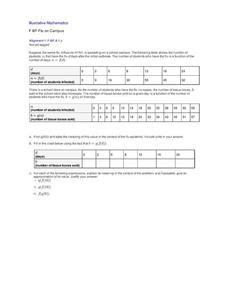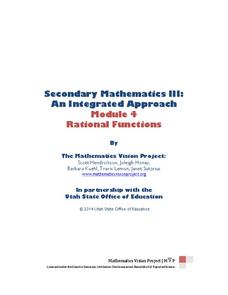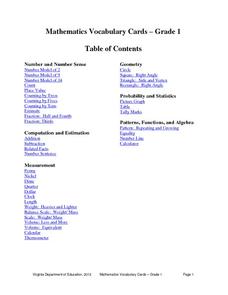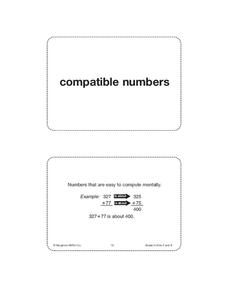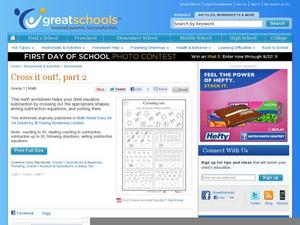Curated OER
Halves
Is it half? There are three sections to this introductory fractions learning exercise focusing on halves. First graders begin by coloring half of five basic shapes, each of which already is divided into two parts. Next, they examine four...
Illustrative Mathematics
Flu on Campus
An outbreak of the swine flu on a school campus has caused an increase in the number of boxes of tissues sold by the school store. In a real-world-modeling activity, pupils use composition of functions to determine how the number of...
MLC
Fractions Packet
Your fifth graders will appreciate the simple, direct explanations, examples, and practice exercises in this well-organized unit on fractions. Beginning with an introduction to fractions, the packet flows smoothly through the fraction...
Mathematics Vision Project
Module 4: Rational Functions
Time to study the most sensible function — rational functions! The seven-lesson unit develops the concept of a rational function through a connection to rational numbers and fractions. Scholars graph functions, solve equations, and...
Federal Reserve Bank
Investing in Yourself: An Economic Approach to Education Decisions
What is the difference between physical capital and human capital, and in which should you invest? While considering the concept of return on investment, take a look at the payoffs and consequences of investing in training and...
Virginia Department of Education
Mathematics Vocabulary Cards - Grade 1
Clarify basic math concepts with a series of vocabulary posters designed for first graders. The cards include illustrations for fractions, place value, tally marks, and number lines, as well as many more vocabulary words.
Houghton Mifflin Harcourt
Unit 8 Math Vocabulary Cards (Grade 3)
A set of 9 math vocabulary cards prompts young mathematicians to master division concepts. The top half of each sheet contains the word printed in bold text, while the bottom half has the definition card.
EngageNY
Writing Equations Using Symbols
Build upon prior equation writing experience to create more complicated equations. Lesson one in a 33-part unit builds upon the class members' sixth and seventh grade experience of writing linear equations. Several examples...
Curated OER
Adding Decimals
Show scholars the practical uses of adding numbers with decimals as they add measurements and amounts of money. The first 12 equations are written vertically with half the sums requiring a dollar sign and half a unit of measurement. The...
Curated OER
Adding Decimals
Adding decimals can be simple; show scholars the practical uses of adding numbers with decimals as they add measurements and amounts of money. The first eight equations are written vertically with some sums requiring a dollar sign, some...
Curated OER
Counting: Connecting Pictures and Numbers
As young scholars begin connecting numbers with values, help them grasp this concept with sets of objects like these. They examine five sets (up to 15 in number) and match each to a corresponding digit. Then, they draw a set of their own...
Curated OER
Crossing Out
By crossing out objects young mathematicians can begin comprehending subtraction concepts. They examine six sets, each including two types of shapes. Learners choose one shape to cross out, filling in the subtraction equation this way...
Curated OER
Do You Know?: Days, Months, Minutes, and Hours
It's all about time as scholars focus on years, months, weeks, days, hours, minutes, and seconds to practice these concepts. First they put all 12 months back in order, numbering them 1st, 2nd, etc. Two are done for them. Next, there are...
Curated OER
Sets Of
Represent multiplication as sets of items for beginners to this concept. They look at six familiar object sets and determine the total number of legs by counting the sets. There is some scaffolding here, as the first is done for them and...
DK Publishing
Sets
Do scholars understand multiplication as sets of numbers? Help them grasp this concept through groups of objects arranged as a makeshift multiplication number sentence. They examine the sets and fill in boxes to indicate how many sets of...
Curated OER
Line Graphs
Let's take a look at Luis' bike ride! Scholars examine a line graph charting a 20-kilometer bike ride over the course of six hours. They answer six questions about the data requiring the understand the concepts of each axis and the line...
Curated OER
Symmetry
Where is the line of symmetry? Learners begin by drawing in a line to split three images evenly in half, using an example as reference. Encourage them to think about physically folding the picture to solidify this concept. Next, they do...
DK Publishing
Multiply or Divide? Choosing the Operation
Division or multiplication? Scholars examine 36 number sentences, each missing either a division or multiplication symbol...but which one fits? They write in the signs based on the numbers given, all of which are whole numbers. The first...
Curated OER
Dividing by 3
Use money to practice basic division concepts with young scholars. Each of the seven problems has a set of coins and three empty purses. They add up the coins for a total value and fill in a blank division number sentence to demonstrate...
Curated OER
Quarters
Set up youngsters for fraction success years down the road with this focus on quarters. They begin with examining five shapes that have been equally segmented into four parts. Using one example as reference, learners shade a quarter of...
Curated OER
Bar Graphs and Pictographs
How are bar graphs and pictographs different? As you begin this concept, use these simple graphs to help get learners started with data analysis styles. There is one bar graph and one pictograph, each accompanied by four or five...
Curated OER
Recognizing Multiples
By asking learners to identify multiples of 6, 7, and 8, you will be able to assess their grasp of these multiplication facts. For each of these numbers learners examine five set of digits and circle the multiples from the sets. A final...
Thomson Brooks-Core
Complex Numbers
A straightforward approach to teaching complex numbers, this lesson addresses the concepts of complex numbers, polar coordinates, Euler's formula, De moivres Theorem, and more. It includes a practice problems set with odd answers...
West Contra Costa Unified School District
Congruence Through Transformations
Transform your lesson on transformations. Learners use given congruent triangles and tracing paper to determine the single transformation that carries one to the other. The concept is extended to combinations of transformations to...

